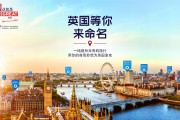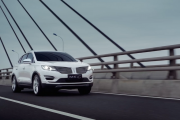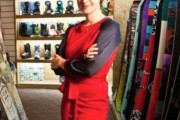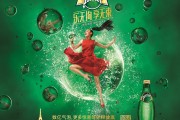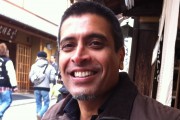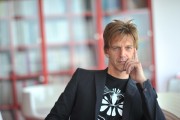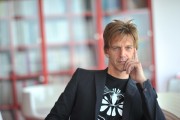Prior to assuming the dual role of Group Creative Director and Head of Integrated Solutions at 180 in China, Cheelip Ong had previously managed some of the world’s most renowned advertising networks and brands, in markets as diverse as Singapore, Vietnam and Tokyo. Before joining 180, Cheelip Ong was a founding member, management board executive and Creative Director at Frontage Asia – a highly awarded integrated agency that is owned by both Dentsu Inc. and Sony. There, he was responsible for helping Frontage Tokyo establish their Asia-Pacific headquarters in Singapore, as well as overseeing the creative output for Sony across Singapore, Malaysia, Philippines, Vietnam, Thai, Indonesia and Thailand. He was also responsible for the BRAVIA “Flowers” TVC that was broadcasted globally and was featured on “Best Ads on TV.”
Interview
Miguel Roberg: Today, I am interviewing Cheelip Ong, Group Creative Director and Head of Integrated Solutions at 180. The first question is “Why did you come to China and what attracted you to China?
Cheelip Ong: I think a lot of it was based on fate and chance. Before I arrived in China in March 2013, I was offered two other Creative Director positions. The first offer was from a multinational ad agency in Hong Kong and the second offer was from Dubai. While I was considering my options, I received a call from a headhunter from the UK and he told me about an agency in China that was interested in my capabilities. Shortly after talking with the headhunter, I was given an interview with the founder of 180, Mr. Stone Lei (Cannes Jury and Speaker). During the course of our conversation, I realized that we shared a common vision and that made me decide to move to China. I think you have to make a decision based on who you are going to partner with in the agency. I believe in Stone Lei’s vision for 180 and we have natural chemistry. That convinced me to commit myself to make the shift and relocate to Beijing.
MR: I would like to know a little more about your past. Can you tell me how you became interested in advertising? And especially creatives?
CO: I think, if you want to know how I became interested in advertising; it will go back to more than a decade ago when I was in college, I was very interested in the expression of words and ideas. So, I started by writing for many magazines and after a while I got tired of writing for magazines because I realized I was always writing about other people’s stories and creations. I was not creating anything I could call my own. During that time, I saw a few good ads and I decided that I could do better. That was how I decided to forge a career in advertising; I wanted to use my imagination to help shape culture, human behavior and society and ultimately entertain someone and make their time better spent while viewing my ads.
MR: You have worked with some of the major advertising agencies; can you tell me a little bit about the work you were doing before you came to China in 2013?
CO: Before I arrived in China, I was working for an agency called Frontage Asia. Frontage is a well-known agency owned by Sony and Dentsu. At the time I was working with them, they were trying to set up an Asia Pacific headquarter in Singapore and I was hired by Yukio Nakayama to help establish the agency in Singapore. After setting up with the agency, I was in charge of the Sony account across Singapore, Malaysia, Thailand, Vietnam, Philippines, and Indonesia. It was an amazing experience working with creatives both in Singapore and Japan. Managing the Sony account was a great opportunity and I still keep in touch with many of my colleagues in Japan and Singapore.
MR: What are your current responsibilities and what are the core values of 180?
CO: I joined the 180 with one main task and that was to transform the agency into a fully integrated agency. So, I have been busy breaking down barriers around how creatives, social media specialists, digital experts, and account managers communicate and conceptualize. I am restructuring the agency model from a traditional art director and copywriter team to a fully integrated team. Now, when we conceptualize an idea for a client, we will have storytellers, copywriters, art directors, digital/social media specialists and account managers coming together to create the best solution for the project. I have created a system where different experts can come together and work for the common good of a client, with no barriers or divisions.
I also have been tasked with forging a vision for the agency. In 2012, 180 was ranked has one of the world’s top ten best independent agencies and I was tasked with creating an agency model that will be applicable for the future. There is a lot of restructuring and “architecting” in terms of how I am building the agency on a day to day basis. Besides growing the agency, we have to think about how we can stay up-to-date with the most cutting edge ideas and how we can create those ideas for our clients from a non-advertising perspective. We want to be known as the ad agency which creates fresh “non-advertising-liked ideas” that can produce real impact on brands, society, and culture.
MR: How is this experience different than working for a major advertising agency?
CO: We have a lot more autonomy when making decisions because we do not need to answer to global headquarters. We can think on our feet and respond fast to a client’s needs. We have a very strong, unique philosophy on how we create an idea in our agency, which is called S.E.E.T. When we conceptualize a campaign, we believe that for it to be successful, it has to have a great Storyline, be Engaging, Entertaining, and it should create Topicality, so people can discuss and talk about it. At 180, we work with this philosophy in mind and everyone on the team is driven by a common desire to create groundbreaking work. Compared to an MNC model, we have more freedom on how we can express our ideas and we have more autonomy in terms of how we make decisions, which makes us more responsive.
MR: Which type of agencies do you feel more productive working in a 4A or an independent agency?
CO: Well, if you are going to be a good creative you don’t limit yourself on where you are going to be more productive. I think no matter where I work, independent agency or MNC agency, I will put my best work forward and I will fully commit myself to the work I am doing. If you really want to be a professional creative, it doesn’t matter the size of the agency you are working with because it is about the size of your passion. It is the size of the ideas, not about the size of the agency. What really matters is who you are and how driven you are to produce quality work.
MR: Being the Group Creative Director and Head of Integrated Solutions at 180, what is one of the biggest problems you face in China? And how are you working to overcome that issue?
CO: One key issue that I face in China is the lack of great creative talents. Compared to more developed markets like the UK or US, China is still in a stage of growth which makes it difficult to find great integrated thinkers, who can think across different media platforms. Often when we hire a local talent, they might be very good at copy writing but have little knowledge of social media marketing. So, we have to train the local talent to think about how each story will be used across multiple platforms and think more about a fully integrated solution to our client’s demands. At 180, we are always trying to drive the future of advertising, so we have to build a team that can think in sync with how the world in evolving.
The biggest problem dealing with client is to get them more accepting to change. Many businesses are still a little traditional in their advertising approaches and I often have to convince them to take more risks by embracing braver ideas. My key task is to get clients to embrace trends and ideas that are more daring and subversive. I try to get them to think about advertising from a non-advertising perspective. Advertising doesn’t have to be TVC or print; it can be mobile game, computer game, social media or social experiment. There are a lot more options available to reach their intended audience, so one challenge is to get clients to embrace new ideas to gain maximum brand equity and brand leverage.
MR: Your recent campaign for JD.COM has been nominated as the Top 10 best integrated social campaigns in China in 2013. Can you tell me a little about the campaign and the creative idea behind it?
CO: As you know November 11 is also known as singles’ day and many e-commerce sites offer extreme discounts on consumer goods. JD.COM is the main competitor of TMall and in order to differentiate JD.COM’s product offering over TMall, we decided to highlight JD.COM’s delivery speed. While all the other e-commerce sites are talking about low prices and discounts, we were able to standout by bringing attention to our client’s unique delivery system. JD.COM has their delivery system which allows them to deliver products much faster (sometimes the same day) than TMall, which uses a third party delivery system. So, we thought that by creating a funny ad about individuals who had to wait “too long” for products was a great way to move our client out of the price war and uniquely market them in the build-up to singles’ day.
Be sure to watch the entire interview to find out more about 180 and the work Cheelip is conducting. A few questions were not covered in the write up, including:
- How do you motivate your team to remain creative and innovative?
- You have won awards for the work you have done, including a Pan-Asia Jury award in 2013. How do you remain creative and innovative? What are some tricks or secrets to remaining creative?
- Could you tell me a little about the awards you have won and/or been nominated for over the years?

